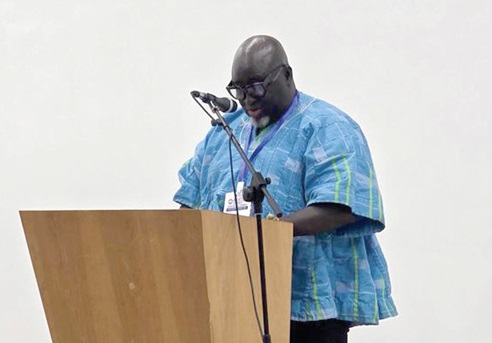
ATU holds maiden Applied Research Conference
The Accra Technical University (ATU) has held its maiden edition of the Applied Research Conference aimed at promoting technology and innovation as practical tools for sustainable development.
The conference, held on the theme: “Advancing Technology and Innovation for a Sustainable Future”, brought together scholars, researchers, policymakers, industry leaders and students to share ideas and generate solutions to contemporary challenges.
The acting Pro Vice-Chancellor of ATU, Professor Felix Y. H. Kutsanedzie, who made the call last Wednesday, urged participants to rethink and refine research in ways that minimise waste and create impactful outcomes for society.
Redefining Waste
Speaking at the conference, Prof. Kutsanedzie emphasised that waste should not be viewed solely as discarded materials but also as the misuse of time, resources and opportunities.

“Non-judicious use of time is waste, misuse of resources is waste. Every research presented here must aim at reducing these inefficiencies,” he said.
He added that contemporary challenges such as climate change, depletion of natural resources, food crises, social inequality, health service delivery and waste management required proactive, pragmatic and collaborative solutions rooted in applied research.
Innovation
The acting Vice-Chancellor of ATU, Prof. Peter Amevi Acakpovi, described the conference as a defining moment in the university’s history.
He said the initiative had created a platform for multi-disciplinary engagement, bringing together three tracks: Engineering Science and Urban Sustainability, Sustainable Business and Entrepreneurship, and Applied Art, Design and Sustainability.
Prof. Acakpovi emphasised that the world’s challenges, including climate change, urbanisation, economic uncertainty and technological disruption, made applied research indispensable.
Alumni support
The Global Alumni Chairman of ATU, David Ayisala, said the alumni had a crucial role in strengthening the link between the classroom, the workplace and society.
He highlighted two recent initiatives: the rollout of a comprehensive alumni database to connect graduates across disciplines and continents, and the deployment of a tracer study application to track graduate employability and guide curriculum review.
Mr Ayisala, who is also a Procurement Manager at the Graphic Communications Group Ltd., said that the alumni body was also partnering the university to improve infrastructure at the Mempemehoasem campus through collaborations with industry leaders and development partners.
Sensors to solutions
Delivering the keynote address, an Associate Professor at the Department of Computer Science, University of Ghana, Prof. Kofi Sarpong Adu-Manu, who spoke on the topic, “From sensors to decisions: Monitoring the environment with sensor devices”, said the country’s recurring challenges with flooding and water quality could be mitigated if relevant sensor devices were deployed to provide early warning signal.
Citing examples, he explained that in the event of a dam spillage, communities could be alerted in advance through messages delivered to their phones.
“The floods that occurred in 2015, which destroyed property and claimed lives, could have been prevented if such devices had been in place,” he said.
Prof. Adu-Manu stressed that while academia could design and develop sensor devices, their cost meant that the government, industry and entrepreneurs needed to support their deployment.
He called for greater investment in Internet of Things (IoT) and artificial intelligence (AI) to address environmental monitoring, adding that research should not only end in publication but also be implemented to support national and regional development.
